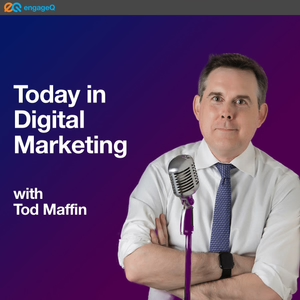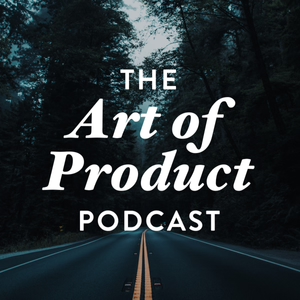
Databricks CEO Ali Ghodsi & MosaicML Founder Naveen Rao Speak at Cerebral Valley
11/21/23 • 22 min
We were delighted to kick off the 2nd Cerebral Valley AI Summit with Ali Ghodsi, CEO of Databricks, and Naveen Rao, co-founder of MosaicML.
Their encounter at our debut event in March led to Ghodsi buying Rao’s company, which had little revenue, for $1.3 billion. At our event on Nov. 15, the two discussed how the deal came together quickly after meeting at the conference dinner.
Thousands of enterprises around the world rely on Oracle Cloud Infrastructure (OCI) to power applications that drive their businesses. OCI customers include leaders across industries, such as healthcare, scientific research, financial services, telecommunications, and more.
NVIDIA DGX Cloud on OCI is an AI training-as-a-service platform for customers to train complex AI models like generative AI applications. Included with DGX Cloud, NVIDIA AI Enterprise brings the software layer of the NVIDIA AI platform to OCI.
Talk with Oracle about accelerating your GPU workloads.
Ghodsi recounted how he started spending some time with Rao and thought, “these guys are pretty good,” and then by chance noticed an employee he respected poking around with MosaicML and offering a strong endorsement. Soon Ghodsi was on the phone with the head of his deals team, who told him “if you want to buy these guys you have to do it this weekend.” Rao said by that point “you kind of know he’s going to pop the question,” and once they worked out the money, the deal was done.
The two executives certainly seemed to be in harmony as they touted the potential benefits from their combination, which in simple terms will bring MosaicML’s expertise in building specialized generative AI models to Databricks’ corporate data platform products, essentially super-charging Databricks for the generative AI era.
They were eager to defend the idea of open-source foundation models that are specific to certain tasks, rejecting the notion that general-purpose models like ChatGPT-4 will eventually swallow everything. (This conversation took place before OpenAI was thrown into chaos by its board of directors.)
Ghodsi said calls to limit open-source models on the grounds that they’ll be too easily exploited by bad actors a “horrible, horrendous” idea that would “put a stop to all innovation.”
“It’s essential that we have an open-source ecosystem,” he said, noting that even now it’s unclear how a lot of AI models work, and open-source research will be critical to answering those questions.
Rao added that many of the people making predictions about how AI would develop are “full of s**t.” On the safety question, he noted that cost alone would stand in the way of any existential risks for a long time, and in the meantime the focus should be on real threats like disinformation and robot safety.
Give it a listen
Get full access to Newcomer at www.newcomer.co/subscribe
We were delighted to kick off the 2nd Cerebral Valley AI Summit with Ali Ghodsi, CEO of Databricks, and Naveen Rao, co-founder of MosaicML.
Their encounter at our debut event in March led to Ghodsi buying Rao’s company, which had little revenue, for $1.3 billion. At our event on Nov. 15, the two discussed how the deal came together quickly after meeting at the conference dinner.
Thousands of enterprises around the world rely on Oracle Cloud Infrastructure (OCI) to power applications that drive their businesses. OCI customers include leaders across industries, such as healthcare, scientific research, financial services, telecommunications, and more.
NVIDIA DGX Cloud on OCI is an AI training-as-a-service platform for customers to train complex AI models like generative AI applications. Included with DGX Cloud, NVIDIA AI Enterprise brings the software layer of the NVIDIA AI platform to OCI.
Talk with Oracle about accelerating your GPU workloads.
Ghodsi recounted how he started spending some time with Rao and thought, “these guys are pretty good,” and then by chance noticed an employee he respected poking around with MosaicML and offering a strong endorsement. Soon Ghodsi was on the phone with the head of his deals team, who told him “if you want to buy these guys you have to do it this weekend.” Rao said by that point “you kind of know he’s going to pop the question,” and once they worked out the money, the deal was done.
The two executives certainly seemed to be in harmony as they touted the potential benefits from their combination, which in simple terms will bring MosaicML’s expertise in building specialized generative AI models to Databricks’ corporate data platform products, essentially super-charging Databricks for the generative AI era.
They were eager to defend the idea of open-source foundation models that are specific to certain tasks, rejecting the notion that general-purpose models like ChatGPT-4 will eventually swallow everything. (This conversation took place before OpenAI was thrown into chaos by its board of directors.)
Ghodsi said calls to limit open-source models on the grounds that they’ll be too easily exploited by bad actors a “horrible, horrendous” idea that would “put a stop to all innovation.”
“It’s essential that we have an open-source ecosystem,” he said, noting that even now it’s unclear how a lot of AI models work, and open-source research will be critical to answering those questions.
Rao added that many of the people making predictions about how AI would develop are “full of s**t.” On the safety question, he noted that cost alone would stand in the way of any existential risks for a long time, and in the meantime the focus should be on real threats like disinformation and robot safety.
Give it a listen
Get full access to Newcomer at www.newcomer.co/subscribe
Previous Episode

The Artificial Intelligence Startup Draft
If you could amass any five artificial intelligence startup bets right now, which companies would you pick?
My Cerebral Valley co-hosts and I took a stab at answering that question with an artificial intelligence startup draft.
Our startup draft starts at 27:35 after a discussion of some of the biggest themes going into this week’s Cerebral Valley AI Summit.
The draft gave us a chance to dissect some of the most promising startups in artificial intelligence right now.
The goal was to amass five companies with the biggest valuation five years from now. We restricted ourselves to AI startups that had raised more than $100 million.
I encourage you to make your own prediction in the comments.
Give it a listen
Get full access to Newcomer at www.newcomer.co/subscribe
Next Episode

Two Titans on the Future of AI (with Reid Hoffman & Vinod Khosla)
Today, we have a double episode for you — two conversations from the Cerebral Valley AI Summit.
Reid Hoffman was fresh off a meeting with President Joe Biden when Hoffman and I sat down on stage at the Cerebral Valley AI Summit Nov. 15. On stage, he told us that working to get Biden elected next year is one of his top priorities.
Then, I sat down with the ever-feisty Vinod Khosla. The investor called for a TikTok ban and more welcoming immigration policies while warning against open-source artificial intelligence projects.
Thousands of enterprises around the world rely on Oracle Cloud Infrastructure (OCI) to power applications that drive their businesses. OCI customers include leaders across industries, such as healthcare, scientific research, financial services, telecommunications, and more.
NVIDIA DGX Cloud on OCI is an AI training-as-a-service platform for customers to train complex AI models like generative AI applications. Included with DGX Cloud, NVIDIA AI Enterprise brings the software layer of the NVIDIA AI platform to OCI.
Talk with Oracle about accelerating your GPU workloads.
Hoffman Plans to Go Big for Biden
Hoffman, fresh off a meeting with President Biden, kicked off the afternoon with a strong endorsement of the President’s record. Hoffman praised Biden for his recent executive order on artificial intelligence.
Reid called himself “a 95%-98% supporter” of the executive order, endorsing provisions on reporting and monitoring, “red team” testing, and voluntary commitments by companies that might eventually be enforced via the Defense Production Act. But he pushed back on the idea that the FTC should be monitoring the AI industry for anti-competitive conduct.
“Startups are not being impeded right now,” he asserted, despite the apparent dominance of OpenAI and the mega-cap tech companies. Reid sits on the board of Microsoft, and offered that he was in fact “first money in” on OpenAI, through his personal foundation, but he’s not concerned about, er, his own companies having too much power. “I don’t think it constrains competition on any level.”
Hoffman is always happy to engage on policy, and I asked him what he thought about Marc Andreessen’s recent “techno-optimist” manifesto, which denigrates the very idea of government oversight. Reid said he was a techno-optimist too, and half-joked that Andreessen “quoted kind of liberally from things I’ve written and said” without any attribution. But Hoffman said that he’s not on board with Andreessen’s approach. “It’s kind of dumb to think that when you have major technologies there can’t be negative side effects,” he said, noting that all his AI projects have safety teams. “Tech can be amazing. Let’s be intentional about building.”
Khosla Wins Cheers from the Cerebral Valley Audience
Venture capitalist Vinod Khosla confirmed that his firm, boosted by an early stake in OpenAI, was about to close on $3 billion in commitments for a new fund. Valuations are high, he said, “but just because valuations are high doesn’t mean it isn’t a good time to invest.”
He’s not buying existential risk, calling it “nonsensical” talk from academics who had nothing better to do. But he’s long on China risk, saying the U.S. is in a “techno-economic war” with China and needs to fight hard. “I would ban TikTok in a nano-second,” he said, unlike his predecessor on stage, Hoffman, who Khosla said he very much admired. Khosla is firmly against open-source AI models as well due to the China risk.
Bio-risk and cyber risk are real concerns too, he noted.
But if China or rogue viruses don’t kill us, Khosla thinks the near-future is very bright: “I do think in 10 years we’ll have free doctors, free tutors, free lawyers” all powered by AI.
Khosla also gave a grudging endorsement of the Biden Executive Order, saying it was “okay.”
But like most Silicon Valley moguls, he has no time for antitrust issues. “We have to get people like Khan out of there,” he said, referring to the chair of the FTC (though misstating her name), calling her “crazy, left-wing.”
Khosla said he’s long believed that AI would force us to “redefine what it is to me human.”
Meantime he himself plans another 25 years of VC investing, and if all goes well, maybe more.
Give it a listen
Get full access to Newcomer at
If you like this episode you’ll love
Episode Comments
Generate a badge
Get a badge for your website that links back to this episode
<a href="https://goodpods.com/podcasts/newcomer-podcast-218840/databricks-ceo-ali-ghodsi-and-mosaicml-founder-naveen-rao-speak-at-cer-37448564"> <img src="https://storage.googleapis.com/goodpods-images-bucket/badges/generic-badge-1.svg" alt="listen to databricks ceo ali ghodsi & mosaicml founder naveen rao speak at cerebral valley on goodpods" style="width: 225px" /> </a>
Copy




